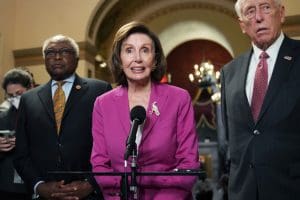200 House Republicans vote against rebuilding America's infrastructure
The House passed the $1.2 trillion package, which would fund improvements to the country’s roads, bridges, and other infrastructure, late Friday night, sending it to President Joe Biden’s desk for his signature.

The House of Representatives passed the Infrastructure Investment and Jobs Act on Friday night by a vote of 228-206, two months after the Senate approved the bill on a bipartisan vote.
A total of 200 Republicans voted against the bipartisan $550 billion infrastructure investment package, along with six progressive Democrats, the latter of whom felt the deal did not go far enough.
The package, which now goes to President Joe Biden for his signature, includes what the White House called “historic” investments in transportation, electrical grid, water systems, and broadband infrastructure. According to a fact sheet issued by the White House on July 28, much of its cost will be “financed through a combination of redirecting unspent emergency relief funds, targeted corporate user fees, strengthening tax enforcement when it comes to crypto currencies, and other bipartisan measures, in addition to the revenue generated from higher economic growth as a result of the investments.”
In March, Biden proposed the $2.25 trillion American Jobs Plan, which included funds for those priorities, as well as additional spending on climate change, clean energy, and child care and caregiving infrastructure.
Republican lawmakers attacked the plan, claiming the climate and human infrastructure investments were not “real infrastructure.”
Senate Minority Leader Mitch McConnell appointed Sen. Shelley Moore Capito (R-WV) to negotiate a deal with the White House.
In late April, Capito proposed a GOP counterplan that would invest only about $189 billion in additional funding, or about 8% of the new funding Biden requested, on transportation, water systems, and broadband. She called this a “robust package” and a “good starting point” for negotiations with Biden.
When after weeks of negotiations Republicans added only about $68 billion to their offer, Biden halted talks in early June.
Instead, a bipartisan group of 21 senators proposed its own infrastructure framework later that month. Eleven Senate Republicans said they would back the package, enough to give Democrats the votes to break any GOP filibuster. Biden endorsed their agreement on June 24.
On July 28, former President Donald Trump announced his strong opposition to the deal, warning GOP lawmakers not to give “the Radical Left Democrats a big and beautiful win on Infrastructure” by passing the bill and threatening Republicans who voted for it with “lots of primaries.”
Trump had promised in his 2016 campaign to “build the next generation of roads, bridges, railways, tunnels, sea ports and airports,” but broke that pledge during his single term in office as a way to punish congressional Democrats for investigating the actions of members of his administration.
After Trump’s comments in July, GOP Sens. Todd Young of Indiana and Mike Rounds of South Dakota, who had been members of the bipartisan group, came out against the deal they had helped create.
Despite the opposition of a majority of GOP senators, the bill passed in the Senate on Aug. 10 by a vote of 69-30.
Biden thanked the Republicans who had voted in favor of the deal — which included Minority Leader Mitch McConnell — for showing “courage” in the process, the New York Times noted.
The bill then moved back to the House. While some more moderate Republicans, including members of the bipartisan House Problem Solvers Caucus, endorsed the Senate package, most followed Trump’s lead and opposed it, eventually voting against the final bill.
Polling has consistently shown strong public support for the bipartisan agreement. Even an August survey by Fox News found 62% of registered voters backed the package, while just 30% opposed it.
Those polls also indicate wide support for Biden’s $1.75 trillion Build Back Better jobs package, a parallel bill which would invest in clean energy, climate change, health care, child care, and home care infrastructure.
Democrats hope to move that bill through Congress in the upcoming weeks.
Published with permission of The American Independent Foundation.
Recommended

Biden calls for expanded child tax credit, taxes on wealthy in $7.2 trillion budget plan
President Joe Biden released his budget request for the upcoming fiscal year Monday, calling on Congress to stick to the spending agreement brokered last year and to revamp tax laws so that the “wealthy pay their fair share.”
By Jennifer Shutt, States Newsroom - March 11, 2024
December jobs report: Wages up, hiring steady as job market ends year strong
Friday’s jobs data showed a strong, resilient U.S. labor market with wages outpacing inflation — welcome news for Americans hoping to have more purchasing power in 2024.
By Casey Quinlan - January 05, 2024
Biden’s infrastructure law is boosting Nevada’s economy. Sam Brown opposed it.
The Nevada Republican U.S. Senate hopeful also spoke out against a rail project projected to create thousands of union jobs
By Jesse Valentine - November 15, 2023








































































